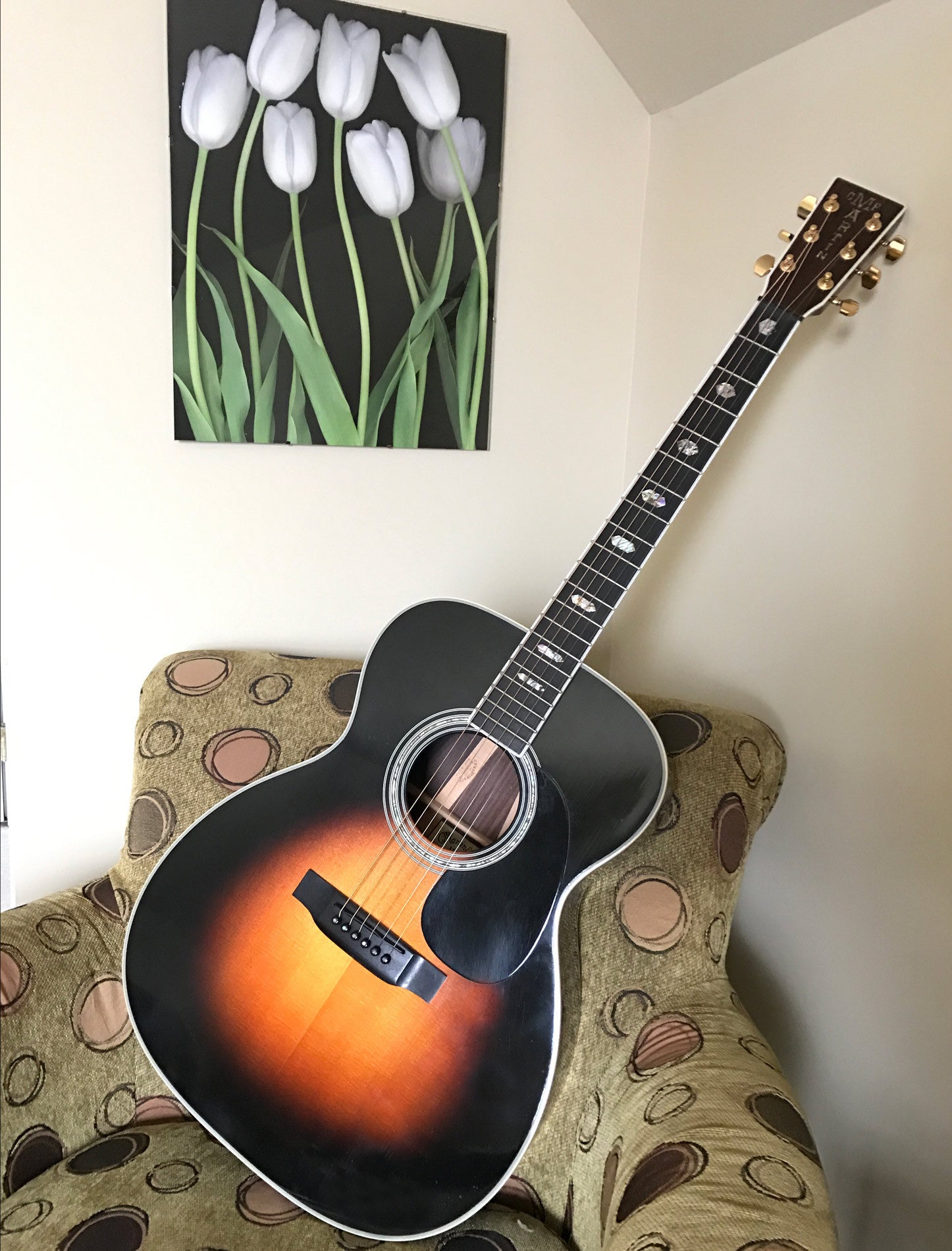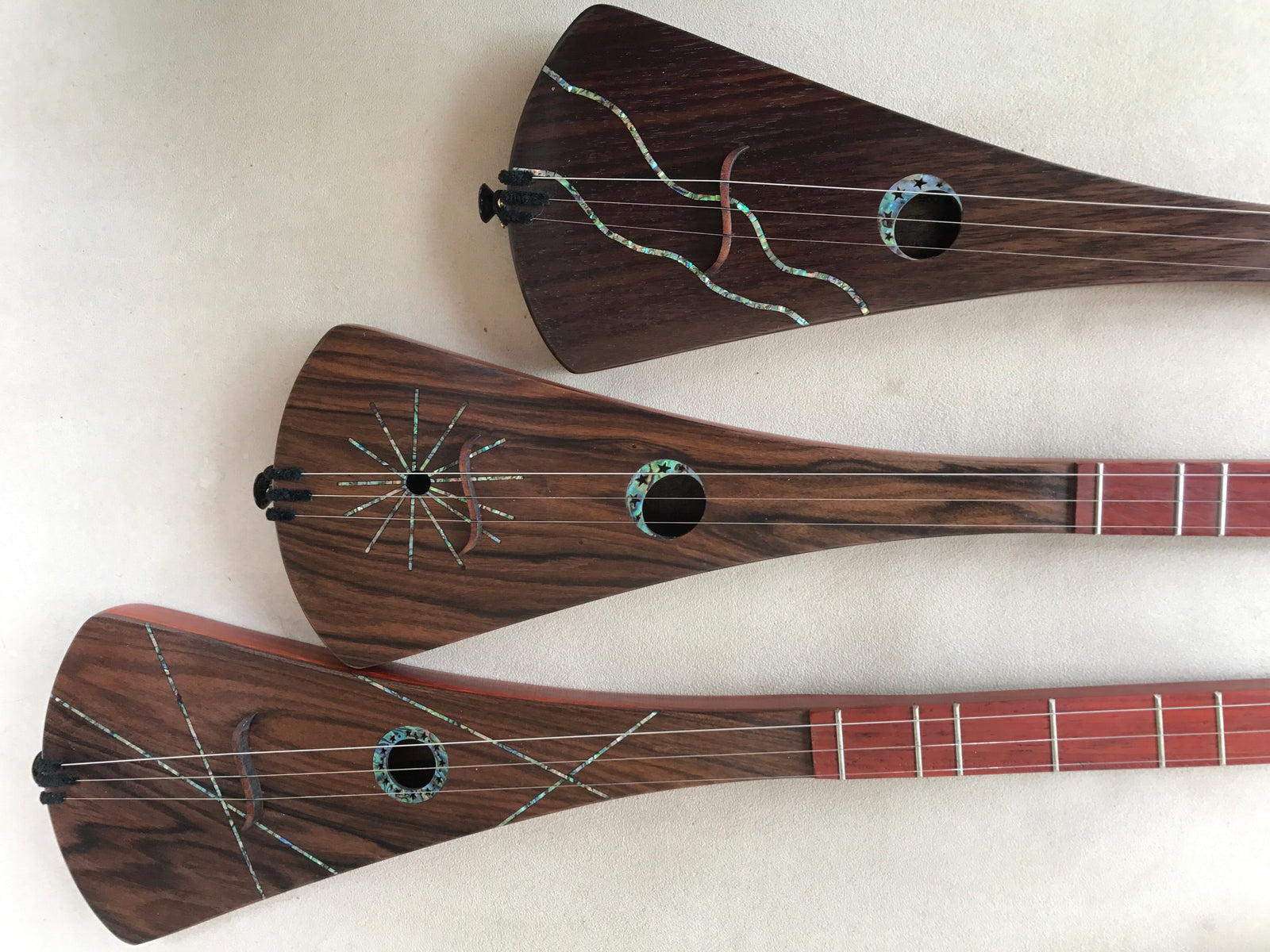8 Steps for Learning Guitar that Ensure Success
(even without a Strumstick).
Here are eight ideas that really help in the early stages of guitar. Our experience shows that using the Strumstick as a pre-Guitar trainer makes a big difference, however these ideas apply whether you use the Strumstick or not. These ideas were developed in 10 years of full-time guitar teaching, and they really help.
1. No Quitting for 6 months.
2. Fire your guitar critic.
3. Practice Less.
4. Keep your guitar OUT of its case.
5. Divide and Conquer.
6. Talk to Yourself (Out Loud).
7. Frustration is Toxic.
8. Play Slower.
1. No Quitting for 6 months
When you start, make a promise to yourself, that you will not allow yourself to quit until 6 months are past. No matter how bad you think you sound. That gives you a lot of time to get past the 3 month dropout hump, and into the time when you are starting to like what you are playing. Making this promise frees you from worrying about “Should I stop? Am I doing well enough to continue?”. You are not allowed to quit for 6 months, so just keep plugging away at it until you prison term is up, and you can quit then ( but by then, you won’t want to!)
2. Fire your guitar critic.
By this I mean, you are going to sound lousy, bad, stupid, awkward,...you are going to sound like a rank beginner for months! That is just the honest truth. So what do you need a critic for? To tell you what you already know?
Every time you tell yourself that you are not doing good enough, you are undermining your will to continue. You are not going to sound good! Accept it!. Accept that you are going to sound lousy for some time, everybody does, it is part of the job, just let it go.
The phrase I use on Strumstick to help with this is, “Enjoy The Noise”. That means that you should just get into the sheer noises you are making. Now the Strumstick only makes nice sounds, so it is easier to Enjoy The Noise, but the point is the same for guitar. When I began on guitar I spent a whole summer playing the riff from “Louie Louie” on one string. Drove my friends crazy, but I loved the sound, it was amazing just to kinda sorta sound like music with 4 little notes. That’s the attitude I’m talking about. Expect (and enjoy) noise, and be pleasantly surprised when something a little musical shows up!
3. Practice Less
Yes, I said LESS. Practice a lot less than you think you should. Make sure that you are practicing on a regular basis, but make sure it is less than you think you should do.
Here's the deal. Everybody knows you should practice a half hour or an hour a day. So who actually does that? Guitar fanatic high school kids who come home from school and go to their room and do nothing but play guitar, that's who. And that is 1 in a thousand high school students. Everybody else who starts to learn guitar practices once a week, which is the only time they can actually get a half hour together to play, and goes to their next lesson feeling guilty that they did not practice more. The answer is, Practice Less. Play for 5 (FIVE)...count them... 1 2 3 4 5 minutes a day, no more!No Kidding! Five minutes is invisible time, you blow off 5 minutes a dozen times in a day. You are 5 minutes late 5 times in a week. So play guitar for just five minutes, BUT DO THAT EVERY DAY, OR AS CLOSE TO THAT AS POSSIBLE! It is the repetition, daily, that builds up your strength, and your co ordination. Six 5 minutes sessions are so much better for you than a single 30 minute session that it is ridiculous.
Remember, when you try to do 30 minutes a day, the rest of your life steals from your guitar playing time. You will decide you just do not have enough time to do 30, and blow off the whole practice. If you pick up your guitar for just five measly rotten little minutes, guess what.. you are going to steal a few more minutes of guitar playing from the rest of your life. Guaranteed. You will play for 6 minutes or 8 minutes, or just imagine, 15 minutes! Well you are cheating, because I said 5 minutes and no more, but what the heck, you might as well feel guilty about playing too much as about playing not enough, right? So play less, not more, and you will get the miles in the saddle that are the only way to learn guitar. Yes, each minute you play equals one mile in the saddle. If you want to ride, you have to put in a lot of miles in the saddle. If you want to play guitar, you have to put in lots of minutes. But it is minutes, not hours. Nobody has hours for guitar (except fanatic high school....), but minutes you can steal; hours you can’t.
4. Keep your guitar OUT of its case.
Buy a guitar stand, or hang it on the wall away from prying fingers that like to twist tuners and break strings, but leave it out of its case. Use some common sense; don’t hang it over a radiator, or in the direct sun, or in the shower.
I know there are voices out there that insist that your guitar will self-destruct if it is not put to bed in its little cage every night, but for 6 months you can leave it out, otherwise it will spend the rest of its life in that little cage, and how much fun is that. If the guitar is out, you will play it. If it is in the case, you will play it a lot less. The little clips that hold the case closed are the second biggest barrier to learning guitar, I promise I promise I promise!
5. Divide and Conquer.
Divide every activity on guitar into two parts, a “mental part”, and a “fingers part”.
Don’t waste your time trying to do a “fingers part” without doing the “mental part” first. Here is why. To finger a certain chord, you have to know where to put your fingers right? That is the mental part. First finger goes on the 5th string, at the second fret, etc., etc. Most people do not get clear where to put their fingers when they learn chords. Instead what they do is call up a hazy mental picture of what the chord seems to look like (and to the beginner brain, they all look more or less alike), and then they hoist their fingers into a blob that looks more or less like the blob image in their head. They cram the whole thing onto the neck, and then wonder why guitar is so hard to do. You just drank 16 oz. of Toxic frustration. First of all, your fingers are probably not in the right spots. Secondly, you can’t teach your fingers where to go, and how to get there, if you don’t really KNOW where your fingers go.
It takes a little patience and discipline to say” First finger goes on fifth string at the second fret” and then put that finger there, then say “second finger goes on the fourth string at the second fret” That takes, ooh... a whole minute! “I am trying to learn guitar here, I can’t waste a minute on figuring out where my fingers go!”
But you waste many minutes when you place your fingers in hazy half-remembered forms that are not the same twice in a row, and you wind up placing them three times to get it right, instead of taking the time to see where they go in the first place. You are a beginner, you aren’t supposed to know! Thats why you are learning. Surrender to not knowing, it is OK! There, doesn’t that feel better? The point is, if you skip the mental step, and jump to the fingers step, you are often wasting the fingers step. If you spell out each finger of the chord you are learning, you will memorize the chord in a very short time. Clearing the mental part, then doing the fingers part applies to each thing you do on guitar. “Hmm, I am going to strum down, down, down up down with my pick, and the rhythm is 1 2 3 and 4. OK, I’ll count that rhythm out loud, and then give it a try.”
6. Talk to Yourself (Out Loud).
Say the names of what you are doing out loud when you are doing them ( “This is a G-major chord”. This is an E-minor chord). Out loud because you are doing four active things to help remember it....You are thinking it, you are speaking it (using muscles in mouth and throat), you are hearing it, with your ears, and you are feeling a little silly for saying it out loud (which actually helps you remember it).
7. Frustration is Toxic.
Yes we said this before, but it’s your guitar playing life we are trying to save here! Frustration is a much bigger enemy than boredom. When you pay attention to what you are doing, when you get clear mentally what you are about to do with your fingers, when you allow yourself to simply do each thing, without worrying about how good it is, or how fast or slow it is, you will not get that bored as a beginner. However, if you press ahead with some confusion, lack of clarity and attention to what you are doing, you will get frustrated, and then you will really get bored. People do not quit guitar because they are bored with it, they quit because they are frustrated. Boredom can be a useful sign that you are ready for the next challenge, and there are a limitless number of them on guitar. But not frustration. Everything you can to to reduce frustration will help you learn guitar.
8. Play Slower.
You have heard it a thousand times, “take your time until you get it right”. But nobody does that. We go sort of slow, but faster than we are able; we are trying (with some desperation) to play it as fast as we would like it to sound, so we push the speed, and it winds up sounding worse. Your toxic frustration factor rises the faster you go. Slow down a little (accept that you are a beginner!) and let your fingers and brain work without the pressure of speed...let your level of ability set the speed, not your desire. There is nothing wrong with pressing for speed once you clearly have something down when played slowly...in that case speed is what you are practicing, not learning how to do the thing in the first place.






Rock Out Loud
August 13, 2025
The point about practising just 5 minutes a day but consistently really cuts through all the usual noise. Also loved the reminder that keeping the guitar out of its case can make such a big difference. These simple mindset shifts are a game-changer for anyone starting guitar lessons.
Rock Out Loud
https://www.rockoutloud.com/guitar-bass/